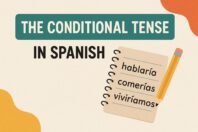The Ultimate Guide to the Spanish Verb Tener

Get our free email course, Shortcut to Conversational.
Have conversations faster, understand people when they speak fast, and other tested tips to learn faster.
More infoThe verb to have in Spanish, tener, is one of the most important and most commonly used among Spanish speakers. You’ve surely come across the verb tener many times.
In this post, we’re going to cover all that there is to know about tener in Spanish. We’ll start off by learning the present tense conjugation, since it’s an irregular verb. Then we’ll get into the main focus of our post, introducing the many meanings of tener in Spanish. We’ll round out the post with a big section on idiomatic expressions, since many uses of tener don’t translate literally as to have in Spanish.
Now let’s dive in and get started on our ultimate guide to tener in Spanish!
The Spanish Verb Tener: The basics
The most common meaning of the verb tener in Spanish is to have. In other words, it’s used to express possession.
- The library in my neighborhood has thousands of books. – La biblioteca de mi barrio tiene miles de libros.
- My next-door neighbours have many dogs. – Mis vecinos de al lado tienen muchos perros.
The verb tener in Spanish is also used to talk about, age, physical sensations, and physical descriptions, among others, and it’s used to express obligations when combined with que. We’ll see more detail for each use of tener in Spanish in the next section.
As for its conjugation, the verb tener is an irregular -er verb. Since the first-person singular conjugation is yo tengo, it’s one of the Spanish yo -go verbs. For the purposes of this post on tener meanings, let’s just cover the basic conjugation of tener in Spanish in the present tense.
| Subject | Tener Present Tense Conjugation |
| Yo | tengo |
| Tú | tienes |
| Él, Ella, Usted | tiene |
| Nosotros, Nosotras | tenemos |
| Vosotros, Vosotras | tenéis |
| Ustedes, Ellos, Ellas | tienen |
- I have blue eyes. – Yo tengo ojos azules.
- You have my lighter. – Tu tienes mi encendedor.
- The car has leather seats. – El carro tiene asientos de cuero.
- We don’t have children. – Nosotros no tenemos hijos.
- You have a lovely family. – Tenéis una familia encantadora.
- My sisters have a bunk bed. – Mis hermanas tienen una litera.
Tener in Spanish: Uses and Meanings
As we saw above, the simplest meaning of tener in Spanish is to have, used to express possession. Many of its other uses and meanings are clear variations of this meaning, while a few are less obvious for English speakers.
So what does the verb tener mean in Spanish? Let’s take a look at when to use tener to express a variety of different meanings.
Tener meaning to hold
We’ll start off very close to our initial meaning of tener, since this use demonstrates that the subject has something in their hands. Here, the verb tener is employed when referring to physically holding or grasping something in one’s hands.
- The policewoman is holding the gun. – La policía tiene el arma.
- I’ve brought the documents you needed. Here you are! – Traje los documentos que necesitabas ¡Aquí los tienes!
- I’m holding the fish and I’m not going to let it go. – Tengo el pez y no lo voy a soltar.
Tener meaning to contain
In a similar vein to its meaning as to have, we can use tener to indicate that a given noun has or contains something. This use is often used when describing the ingredients of foods.
- The house has 3 bathrooms. – La casa tiene 3 baños.
- The burrito has pork in it. – El burrito tiene carne de cerdo.
Tener meaning to include
Like the previous meaning of tener, we can also use it to indicate that something is included.
- The stay includes breakfast. – La estadía tiene desayuno.
- The report includes all the necessary data. – El informe tiene todos los datos necesarios.
Tener to refer to age
In Spanish when we talk about age we don’t use the verb to be as you do in English. Instead, we use tener to state how many years we have.
- My mother is 60 years old. – Mi madre tiene 60 años.
- The twins are 15 years old. – Los mellizos tienen 15 años.
- That house is already about 50 years old. – Esa casa ya tiene como 50 años.
Tener for physical descriptions
Whenever you need to describe someone’s appearance in Spanish, be sure to use the verb tener to state their physical characteristics.
- She has blue eyes. – Ella tiene ojos azules.
- He has blond hair. – Tiene el pelo rubio.
- Sonia has an angel’s smile. – Sonia tiene la sonrisa de un ángel.
Tener to refer to having an illness
We use tener in Spanish to say that we have symptoms or that we have an illness.
- Juan has high temperature today. – Juan tiene fiebre hoy.
- Mariana is not coming to work today because she has an earache. – Mariana no viene a trabajar hoy porque tiene dolor de oído.
- I’m not feeling good, I think I’ve got the flu. – No me siento bien, creo que tengo gripe.
Tener to refer to a scheduled activity
We use the verb tener in Spanish to express that we have to engage in a given activity.
- On Thursday we have an important meeting. – El jueves tenemos una reunión importante.
- Tomorrow I have Victoria’s birthday party. – Mañana tengo la fiesta de cumpleaños de Victoria.
- My friends have Spanish class at 8am. – Mis amigos tienen clase de español a las 8 de la mañana.
Tener to refer to a duration of time
This use of tener in Spanish to refer to duration is mainly found in Latin America. It can be translated into English as “I’ve been doing something for … years / months / weeks.”
- I’ve been here for two years. – Tengo dos años aquí.
- We’ve been practicing piano for many years. – Tenemos muchos años practicando piano.
- They’ve been rehearsing the play for many months. – Tienen muchos meses ensayando la obra de teatro.
The verb llevar in Spanish also shares this same function. We cover it in more detail in our post on the use of llevar and llevarse.
Tener for physical sensations
The verb tener is used to describe certain sensations. It’s generally translated into English with the verb to be + adverb, though in some cases a direct translation exists such as to have hunger or to have fear.
The formula in Spanish is tener + sensation, where the sensation is a Spanish noun. Common ones are cold – frío, hot – calor, hungry – hambre, thirsty – sed, and fear – miedo.
- We are always cold in this restaurant. – Siempre tenemos frío en este restaurante.
- After running, I am hungry. – Después de correr, tengo hambre.
- The kids are afraid at night. – Los niños tienen miedo por la noche.
An important nuance to know is that when you’re feeling hot you should always use this formula and say “tengo calor.” Don’t translate directly from English and say “soy caliente” or “estoy caliente” to talk about temperature, since it rather means “I’m horny.” Whoops!
Tener que to express obligation
Tener que in Spanish is used to express an obligation. Tener que can be translated into English as to have to or ought to. Just like in English with have to, we follow tener que with the infinitive form of the verb whose action the subject is obliged to do.
- I have to study. – Yo tengo que estudiar.
- They don’t have to work on Sundays. – No tienen que trabajar los domingos.
- My boss has to go to Peru next week. – Mi jefe tiene que viajar a Perú la próxima semana.
In Spanish, there are some other ways to express obligation. One of them is by using the expression hay que. If you are interested in this expression in contrast with tener que, check out our dedicated post on hay que vs tener que.
Tener as an auxiliary verb
Tener can function as an auxiliary verb to indicate the successful completion of a task, or the successful attainment of an object.
This structure starts with a conjugated form of tener, followed by the participle of the action verb.
- I’ve already bought the tickets. – Ya tengo compradas las entradas.
- I had planned to buy the house. – Tenía planeado comprar la casa.
- When we got to his house, he had already cooked dinner. – Cuando llegamos a su casa ya tenía preparada la cena.
The meaning when we use of tener as an auxiliary verb differs a bit from when we use of the usual auxiliary verb in Spanish: haber. We cover these differences in greater detail in our post on tener vs haber.
Idiomatic expressions based on Tener
As with any language, Spanish has many expressions that cannot be understood by analyzing their literal translations. Among these are numerous idiomatic expressions based around the verb tener.
If you are interested in a broader post on Spanish expressions, including several that feature the verb tener, check out our post on Spanish idioms.
For now, we’ll present a series of common tener expressions that will make you sound like a native speaker!
Tener en cuenta
To take into account
- You should take into account the pros and cons of the situation. – Debes tener en cuenta los pro y los contra de la situación.
- It is always important to take all details into account. – Siempre es importante tener en cuenta todos los detalles.
Tener razón
To be right
- I don’t know if you are right. – No sé si tienes razón.
- My mum is always right. – Mi mamá siempre tiene razón.
Tener algo por, Tener alguien por
To consider or regard something or someone as
- He takes us for fools, but we already know the truth. – Nos tiene por tontos pero ya sabemos la verdad.
- Juan regards María as an honest person. – Juan tiene a María por honesta.
Tener que ver
To be connected to, To be related to
- Motivation has a lot to do with success in any project. – La motivación tiene mucho que ver con el éxito en cualquier proyecto.
- Why is the weather related to my mood? – ¿Por qué el clima tiene que ver con mi estado de ánimo?
Tener éxito
To be successful
- Luis is doing great abroad. He is very successful! – A Luis le va bien en el extranjero. ¡Tiene mucho éxito!
- The new album is tremendously successful. – El disco nuevo tiene un éxito tremendo.
Tener la culpa
To be guilty
- It is not my fault that you can’t find your glasses. – Yo no tengo la culpa de que tú no encuentres tus anteojos.
- Sorry, we all are guilty. – Perdón, nosotros tenemos la culpa.
Tener fiaca
To get lazy
- He doesn’t want to wash the dishes because he gets lazy. – No quiere lavar los platos porque tiene fiaca.
- I asked her out but she told me “I don’t want to go because I get lazy.” – La invité a salir pero me dijo “No quiero ir porque tengo fiaca”.
This expression is very commonly used in Argentina. For more, check out our full post on Argentine slang.
Tener lugar
To take place
- The wedding will take place in the golden room. – La boda tendrá lugar en el salón dorado.
- The soccer game is going to take place at the local stadium. – El partido de fútbol va a tener lugar en el estadio local.
Tener ganas de
To feel like
- If you feel like it, you can come early. – Si tienen ganas, pueden venir temprano.
- I don’t feel like going, I’m tired. – No tengo ganas de ir, estoy cansado.
Tener todas las de ganar
To have all the winning cards
- Considering your skills and experience, you’ve got all the winning cards. – Considerando tus habilidades y experiencia, tienes todas las de ganar.
- Mateo practiced a lot for the contest, he’s got everything it takes to win. – Mateo practicó mucho para el concurso, tiene todas las de ganar.
Tener la impresión
To get the impression
- I had the impression that you’d loved going to the park very much. – Tuve la impresión de que te había gustado mucho ir al parque.
- I get the impression that Mary is hiding something. – Tengo la impresión de que María está ocultando algo.
No tener donde caerse muerto
To not have a penny to one’s name
- I can’t borrow money from Ivan, he doesn’t have a penny to his name. – No le puedo pedir dinero a Iván, no tiene donde caerse muerto.
- The main character of the story is a vagabond who doesn’t have a penny to his name. – El personaje principal de la novela es un vagabundo que no tiene donde caerse muerto.
Tener alguien presente, Tener algo presente
To keep someone or something in mind
- Every Christmas we have our grandma in mind. – Cada Navidad tenemos a nuestra abuela presente.
- You should always keep your life goals in mind. – Siempre debes tener presente tus metas en la vida.
Tener buena pinta, Tener mala pinta
To look good, To look bad
- That movie’s trailer looks very good. – El avance de esa película tiene muy buena pinta.
- I wouldn’t eat that ham, it looks bad. – Yo no comería ese jamón, tiene mala pinta.
Tener ángel
To be charming
- They all love the teacher. No doubt he’s charming. – Todos quieren mucho al profesor. Sin dudas tiene ángel.
- The main actor has charisma on stage, his presence is magnetic. – El actor principal tiene ángel en el escenario, su presencia es magnética.
Conclusion: Tener in Spanish
Let’s wrap up this post on the Spanish verb tener with a quick review of what we saw. We started off with a quick review of its present tense conjugation, with a series of example tener sentences where the meaning was clearly equivalent to the English verb to have.
Then we moved on to our section on the different tener meanings, showing that it can be used to express much more than possession. We saw examples using the Spanish verb tener to indicate age, express physical sensations, describe obligations, and even convey certain emotional states.
Then came our section on tener expressions, where we learned over a dozen different Spanish idioms. From talking about being successful to feeling guilt, we certainly saw that tener means different things when used in these expressions!
To sum up, given the versatility and frequent usage of the verb tener in Spanish, it’s indispensable to master for effective communication. If you’ve worked your way through this post, you’re now well acquainted with its various uses so you can add them to your linguistic toolkit!
In closing, we’ll leave you with a set of exercises to give you a bit of tener practice. We’re sure you’re going to feel like doing them! – ¡Estamos seguros de que vas a tener ganas de hacerlos!
Tener exercises
Fill in the blanks with the correct forms of tener, tener que, or an idiomatic expression with tener. Look to the equivalent form of tener in English for inspiration. The correct Spanish responses are below.
1. Joaquín no _____ dinero. – Joaquín has no money.
2. Mi papá _____ levantarse temprano para ir a trabajar. – My dad has to wake up early to go to work.
3. Los niños _____ ir a la escuela. – The kids have to go to school.
4. ¡Qué rica esa torta y _____! – What a yummy cake, and it looks so good!
5. La hamburguesa _____ tocineta. – The burger has bacon in it.
6. Enrique ya _____ la tarea hecha. – Enrique has already done his homework.
7. Yo no _____ de tu fracaso. – I’m not [the one] to blame for your failure.
8. Hoy no vienen a trabajar porque _____ fiebre. – Today they’re not coming to work because they [both] have a fever.
9. Abrí la ventana porque _____. – I opened the door because I’m hot.
10. Rocío _____ un cabello precioso. – Rocío has gorgeous hair.
Answers
1. Joaquín no tiene dinero. – Joaquín has no money.
2. Mi papá tiene que levantarse temprano para ir a trabajar. – My dad has to wake up early to go to work.
3. Los niños tienen que ir a la escuela. – The kids have to go to school.
4. ¡Qué rica esa torta y tiene pinta! – What a yummy cake, and it looks so good!
5. La hamburguesa tiene tocineta. – The burger has bacon in it.
6. Enrique ya tiene la tarea hecha. – Enrique has already done his homework.
7. Yo no tengo la culpa de tu fracaso. – I’m not [the one] to blame for your failure.
8. Hoy no vienen a trabajar porque tienen fiebre. – Today they’re not coming to work because they [both] have a fever.
9. Abrí la ventana porque tengo calor. – I opened the door because I’m hot.
10. Rocío tiene un cabello precioso. – Rocío has gorgeous hair.


